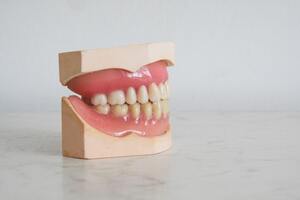Complete vs. Partial Dentures: Which Is Right for Lewisville Residents?
Cuerpo
If you're considering dentures to replace missing teeth, you may be wondering which type is best for your needs. For residents of Lewisville, the decision between complete and partial dentures depends on several factors, including the number of missing teeth, the condition of your gums, and your overall oral health. Here’s a closer look at both options to help you determine which one is right for you.
Complete Dentures: A Full Smile Restoration
Complete dentures are designed to replace all of the teeth in either the upper or lower jaw. If you've lost all of your natural teeth, complete dentures offer a comprehensive solution to restore both the appearance and function of your smile.
Benefits of Complete Dentures:
-
Full Tooth Replacement: Complete dentures are ideal for individuals who have lost all their teeth in a particular arch. They provide full coverage, offering a natural look and feel.
-
Improved Chewing and Speaking: Dentures help improve your ability to eat a variety of foods and speak clearly, which may have been difficult with missing teeth.
-
Support for Facial Structure: Complete dentures help maintain the shape of your face and prevent the sunken appearance that can occur when teeth are missing for an extended period.
-
Affordable Option: For those missing an entire set of teeth, complete dentures are typically a cost-effective solution compared to other restorative options like implants.
Challenges of Complete Dentures:
-
Adaptation Period: Getting used to complete dentures can take time, and you may experience some initial discomfort or difficulty speaking.
-
Fit and Maintenance: Regular visits to your dentist are essential for adjustments as your gums and jawbone change shape over time.
Partial Dentures: A Solution for Missing Some Teeth
Partial dentures are designed for individuals who still have some natural teeth remaining. These dentures fill in the gaps caused by missing teeth, using a combination of artificial teeth and a metal or acrylic base that attaches to your natural teeth.
Benefits of Partial Dentures:
-
Preserves Natural Teeth: Partial dentures can help you retain and protect your remaining natural teeth while filling in the spaces caused by missing teeth.
-
Customizable Design: Your dentist can design partial dentures to match the color and shape of your remaining teeth, ensuring a natural, seamless look.
-
Easy to Maintain: Partial dentures are removable, making them easy to clean and maintain. They are also less invasive compared to permanent solutions like implants.
-
Cost-Effective: Partial dentures are generally more affordable than other tooth replacement options, such as dental implants or bridges.
Challenges of Partial Dentures:
-
Potential Discomfort: While partial dentures can be comfortable, some patients may experience irritation or discomfort at first, particularly if the denture doesn’t fit perfectly.
-
Risk of Loosening: Over time, partial dentures may become loose due to changes in the fit, requiring adjustments or replacements.
Which Option Is Right for You?
The choice between complete and partial dentures depends on how many teeth you’ve lost and the condition of your remaining teeth. If you’ve lost most or all of your teeth, complete dentures may be the best choice. If you still have healthy, intact teeth, partial dentures might be the right solution to complete your smile.
Conclusion
Both complete and partial dentures offer unique benefits to Lewisville residents, depending on their specific needs. To determine which type of denture is right for you, schedule a consultation with a trusted dentist in Lewisville who can assess your oral health and help you make an informed decision. With the right denture solution, you can enjoy a beautiful smile, improved function, and renewed confidence.








Comentarios